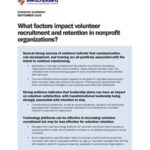This systematic literature review explores the critical role of leadership in influencing volunteer retention and intent to remain within Nonprofit Organizations (NPOs). Despite the essential contribution of volunteers to the sustainability of NPOs, research on how leadership influences these dynamics remains poor. This review aims to fill this gap by identifying the main appro aches to leadership and their effects on volunteer outcomes. Following the PRISMA guidelines, 13 peer – reviewed articles published between 2000 and 2024 were selected for analysis. A qualitative analysis of these studies was conducted using the T-Lab software to analyze semantic associations. Findings suggest that Leader-Member Exchange (LMX) theory, servant, and transformational leadership are the most prevalent approaches used to explain volunteers’ intentions to remain. The review also underscores the significant mediation role of work-related and individual factors, such as job satisfaction and volunteers’ motivation, which are influenced by these leadership styles. Effective leadership enhances volunteer retention and fosters deeper organizational commitment and satisfaction, contributing to the sustained volunteer engagement and operational success of NPOs. This study emphasizes the need for tailored leadership strategies to nurture and retain volunteer workforces, which are essential components of NPOs.
A Systematic Review on the Impact of Trauma-Informed Education Programs on Academic and Academic-Related Functioning for Students Who Have Experienced Childhood Adversity
The purpose of this study was to conduct a systematic review of the existing literature regarding trauma-informed education programs and their impact on academic and

